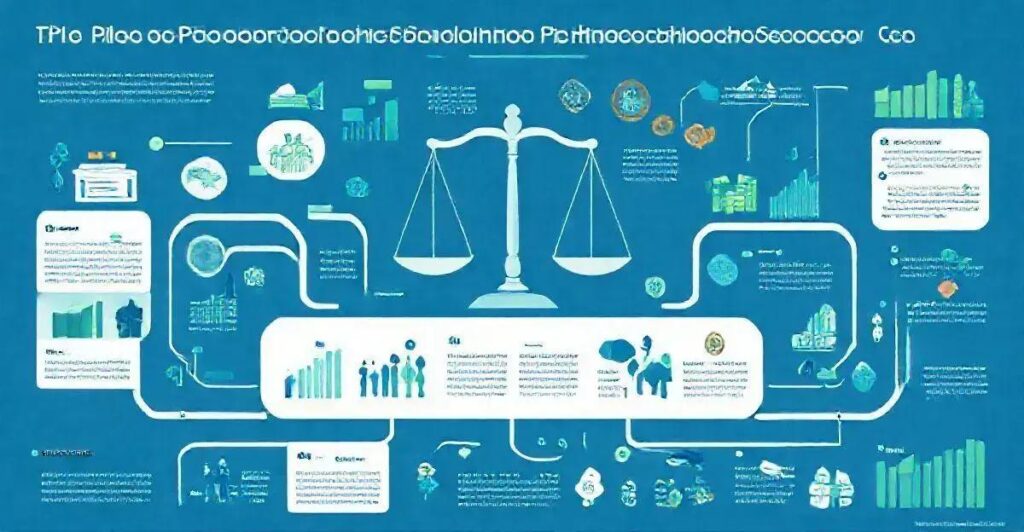In today’s fast-paced financial landscape, understanding economic policy is crucial for making informed decisions about your money.
With economic policy in finance playing a significant role in shaping market trends and affecting consumer spending, it’s essential to stay up-to-date on the latest developments.
In this article, we’ll delve into the world of economic policy, exploring its impact on financial markets, businesses, and consumers alike.
Economic Policy Overview
Economic policy refers to the actions taken by governments to manage their country’s economy. It involves setting goals, implementing policies, and monitoring the outcomes to achieve economic stability, growth, and prosperity. Economic policy has a significant impact on the daily lives of citizens, from employment opportunities to the prices of goods and services. Understanding economic policy is crucial for individuals, businesses, and policymakers alike.
There are various types of economic policies, including fiscal policy, monetary policy, and supply-side policy. Fiscal policy involves the government’s use of taxation and spending to influence the economy. Monetary policy involves the central bank’s control of interest rates and money supply. Supply-side policy focuses on reducing barriers to production, such as taxes and regulations. Each type of policy has its strengths and weaknesses, and policymakers must carefully consider their impact when making decisions.
The Impact of Economic Policies on Financial Markets
Economic policies have a significant impact on financial markets, including interest rates, inflation, and employment. Fiscal policy can influence the money supply, which can affect interest rates and inflation. Monetary policy can impact the availability of credit and the value of currencies. Supply-side policy can affect the cost of production and the competitiveness of businesses. Understanding the potential impact of economic policies on financial markets is essential for investors, businesses, and policymakers.
Economic Policy and Its Effects on Businesses
Economic policies can have both positive and negative effects on businesses. A well-crafted policy can stimulate growth, create jobs, and increase competitiveness. However, a policy mistake can lead to economic downturns, job losses, and reduced competitiveness. Businesses must stay informed about economic policies and their potential impact to navigate the ever-changing economic landscape.
Economic Policy and Consumer Spending
Economic policies can influence consumer spending, which is a key driver of economic growth. Fiscal policy can affect disposable income, which can impact consumer spending. Monetary policy can influence interest rates, which can affect consumer borrowing and spending. Supply-side policy can affect the prices of goods and services, which can impact consumer purchasing power. Understanding the impact of economic policies on consumer spending is essential for policymakers and businesses.
Economic Policy and Global Trade
Economic policies can influence global trade, including the flow of goods and services across borders. Fiscal policy can affect the competitiveness of businesses, which can impact their ability to export goods. Monetary policy can influence the value of currencies, which can affect the competitiveness of imports and exports. Supply-side policy can affect the cost of production, which can impact the competitiveness of businesses. Understanding the impact of economic policies on global trade is essential for policymakers and businesses.
Types of Economic Policies

Economic policy refers to the actions taken by governments to manage their country’s economy. It involves setting goals, implementing policies, and monitoring the outcomes to achieve economic stability, growth, and prosperity. Economic policy has a significant impact on the daily lives of citizens, from employment opportunities to the prices of goods and services. Understanding economic policy is crucial for individuals, businesses, and policymakers alike.
Economic policies can be categorized into three main types: fiscal, monetary, and supply-side policies. Fiscal policy involves the government’s use of taxation and spending to influence the economy. Monetary policy involves the central bank’s control of interest rates and money supply. Supply-side policy focuses on reducing barriers to production, such as taxes and regulations. Each type of policy has its strengths and weaknesses, and policymakers must carefully consider their impact when making decisions.
Economic policies have a significant impact on financial markets, including interest rates, inflation, and employment. Fiscal policy can influence the money supply, which can affect interest rates and inflation. Monetary policy can impact the availability of credit and the value of currencies. Supply-side policy can affect the cost of production and the competitiveness of businesses. Understanding the potential impact of economic policies on financial markets is essential for investors, businesses, and policymakers.
Economic policies can have both positive and negative effects on businesses. A well-crafted policy can stimulate growth, create jobs, and increase competitiveness. However, a policy mistake can lead to economic downturns, job losses, and reduced competitiveness. Businesses must stay informed about economic policies and their potential impact to navigate the ever-changing economic landscape.
Economic policies can influence consumer spending, which is a key driver of economic growth. Fiscal policy can affect disposable income, which can impact consumer spending. Monetary policy can influence interest rates, which can affect consumer borrowing and spending. Supply-side policy can affect the prices of goods and services, which can impact consumer purchasing power. Understanding the impact of economic policies on consumer spending is essential for policymakers and businesses.
Economic policies can influence global trade, including the flow of goods and services across borders. Fiscal policy can affect the competitiveness of businesses, which can impact their ability to export goods. Monetary policy can influence the value of currencies, which can affect the competitiveness of imports and exports. Supply-side policy can affect the cost of production, which can impact the competitiveness of businesses. Understanding the impact of economic policies on global trade is essential for policymakers and businesses.
The Impact of Economic Policies on Financial Markets
Economic policy refers to the actions taken by governments to manage their country’s economy. It involves setting goals, implementing policies, and monitoring the outcomes to achieve economic stability, growth, and prosperity.
Economic policies can be categorized into three main types: fiscal, monetary, and supply-side policies. Fiscal policy involves the government’s use of taxation and spending to influence the economy. Monetary policy involves the central bank’s control of interest rates and money supply. Supply-side policy focuses on reducing barriers to production, such as taxes and regulations.
Economic policies have a significant impact on financial markets, including interest rates, inflation, and employment. Fiscal policy can influence the money supply, which can affect interest rates and inflation. Monetary policy can impact the availability of credit and the value of currencies. Supply-side policy can affect the cost of production and the competitiveness of businesses.
Economic policies can have both positive and negative effects on businesses. A well-crafted policy can stimulate growth, create jobs, and increase competitiveness. However, a policy mistake can lead to economic downturns, job losses, and reduced competitiveness. Businesses must stay informed about economic policies and their potential impact to navigate the ever-changing economic landscape.
Economic policies can influence consumer spending, which is a key driver of economic growth. Fiscal policy can affect disposable income, which can impact consumer spending. Monetary policy can influence interest rates, which can affect consumer borrowing and spending. Supply-side policy can affect the prices of goods and services, which can impact consumer purchasing power.
Economic policies can influence global trade, including the flow of goods and services across borders. Fiscal policy can affect the competitiveness of businesses, which can impact their ability to export goods. Monetary policy can influence the value of currencies, which can affect the competitiveness of imports and exports. Supply-side policy can affect the cost of production, which can impact the competitiveness of businesses.
Economic Policy and Its Effects on Businesses

Economic policy refers to the actions taken by governments to manage their country’s economy. It involves setting goals, implementing policies, and monitoring the outcomes to achieve economic stability, growth, and prosperity.
Economic policies can be categorized into three main types: fiscal, monetary, and supply-side policies. Fiscal policy involves the government’s use of taxation and spending to influence the economy. Monetary policy involves the central bank’s control of interest rates and money supply. Supply-side policy focuses on reducing barriers to production, such as taxes and regulations.
Economic policies have a significant impact on financial markets, including interest rates, inflation, and employment. Fiscal policy can influence the money supply, which can affect interest rates and inflation. Monetary policy can impact the availability of credit and the value of currencies. Supply-side policy can affect the cost of production and the competitiveness of businesses.
Effective economic policies can have a significant impact on businesses, influencing their ability to grow, innovate, and compete in the market. For instance, a well-crafted fiscal policy can stimulate growth, create jobs, and increase competitiveness. Meanwhile, a poorly designed policy can lead to economic downturns, job losses, and reduced competitiveness.
Economic policies can influence consumer spending, which is a key driver of economic growth. Fiscal policy can affect disposable income, which can impact consumer spending. Monetary policy can influence interest rates, which can affect consumer borrowing and spending. Supply-side policy can affect the prices of goods and services, which can impact consumer purchasing power.
Economic policies can influence global trade, including the flow of goods and services across borders. Fiscal policy can affect the competitiveness of businesses, which can impact their ability to export goods. Monetary policy can influence the value of currencies, which can affect the competitiveness of imports and exports. Supply-side policy can affect the cost of production, which can impact the competitiveness of businesses.
Economic Policy and Consumer Spending
Economic policy refers to the actions taken by governments to manage their country’s economy. It involves setting goals, implementing policies, and monitoring the outcomes to achieve economic stability, growth, and prosperity.
Economic policies can be categorized into three main types: fiscal, monetary, and supply-side policies. Fiscal policy involves the government’s use of taxation and spending to influence the economy. Monetary policy involves the central bank’s control of interest rates and money supply. Supply-side policy focuses on reducing barriers to production, such as taxes and regulations.
Economic policies have a significant impact on financial markets, including interest rates, inflation, and employment. Fiscal policy can influence the money supply, which can affect interest rates and inflation. Monetary policy can impact the availability of credit and the value of currencies. Supply-side policy can affect the cost of production and the competitiveness of businesses.
Effective economic policies can have a significant impact on businesses, influencing their ability to grow, innovate, and compete in the market. For instance, a well-crafted fiscal policy can stimulate growth, create jobs, and increase competitiveness. Meanwhile, a poorly designed policy can lead to economic downturns, job losses, and reduced competitiveness.
Economic policies can influence consumer spending, which is a key driver of economic growth. Fiscal policy can affect disposable income, which can impact consumer spending. Monetary policy can influence interest rates, which can affect consumer borrowing and spending. Supply-side policy can affect the prices of goods and services, which can impact consumer purchasing power. For example, a well-designed fiscal policy can increase consumer spending by reducing taxes and increasing government spending on social programs.
Economic policies can influence global trade, including the flow of goods and services across borders. Fiscal policy can affect the competitiveness of businesses, which can impact their ability to export goods. Monetary policy can influence the value of currencies, which can affect the competitiveness of imports and exports. Supply-side policy can affect the cost of production, which can impact the competitiveness of businesses.
Economic Policy and Global Trade

Economic policy refers to the actions taken by governments to manage their country’s economy. It involves setting goals, implementing policies, and monitoring the outcomes to achieve economic stability, growth, and prosperity.
Economic policies can be categorized into three main types: fiscal, monetary, and supply-side policies. Fiscal policy involves the government’s use of taxation and spending to influence the economy. Monetary policy involves the central bank’s control of interest rates and money supply. Supply-side policy focuses on reducing barriers to production, such as taxes and regulations.
Economic policies have a significant impact on financial markets, including interest rates, inflation, and employment. Fiscal policy can influence the money supply, which can affect interest rates and inflation. Monetary policy can impact the availability of credit and the value of currencies. Supply-side policy can affect the cost of production and the competitiveness of businesses.
Effective economic policies can have a significant impact on businesses, influencing their ability to grow, innovate, and compete in the market. For instance, a well-crafted fiscal policy can stimulate growth, create jobs, and increase competitiveness. Meanwhile, a poorly designed policy can lead to economic downturns, job losses, and reduced competitiveness.
Economic policies can influence consumer spending, which is a key driver of economic growth. Fiscal policy can affect disposable income, which can impact consumer spending. Monetary policy can influence interest rates, which can affect consumer borrowing and spending. Supply-side policy can affect the prices of goods and services, which can impact consumer purchasing power. For example, a well-designed fiscal policy can increase consumer spending by reducing taxes and increasing government spending on social programs.
Economic policies can influence global trade, including the flow of goods and services across borders. Fiscal policy can affect the competitiveness of businesses, which can impact their ability to export goods. Monetary policy can influence the value of currencies, which can affect the competitiveness of imports and exports. Supply-side policy can affect the cost of production, which can impact the competitiveness of businesses. For instance, a well-designed fiscal policy can increase exports by reducing taxes and increasing government spending on infrastructure, making it easier for businesses to export goods and services.
FAQ – Frequently Asked Questions about Artificial Intelligence in Small Business
How can automation of tasks benefit my small business?
Automation of tasks frees up your team from repetitive activities, increasing productivity and allowing them to focus on more strategic tasks.
What tools can I use for data analysis?
There are various tools available, such as Google Analytics, Tableau, and Microsoft Power BI, that help collect and interpret valuable data.
What are chatbots and how do they improve customer service?
Chatbots are virtual assistants that can answer questions and solve problems at any time, improving customer experience and freeing up your team.
How can I personalize customer experience?
Through data analysis, you can better understand customer preferences and offer personalized recommendations and promotions.
What is the importance of customer feedback?
Feedback is essential to identify areas that need improvement and adjust your strategy to ensure customer satisfaction.
Is artificial intelligence accessible for small businesses?
Yes, there are various AI solutions that are accessible and scalable for small businesses to improve efficiency and customer service.



